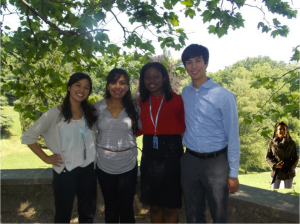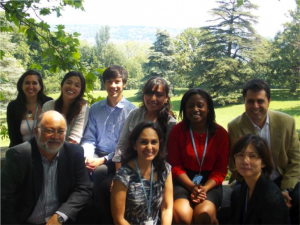Hello again,
Today is my last day in Geneva, Switzerland, and tomorrow I will take a flight back to Houston, USA. This has been quite an unforgettable summer. My internship with the World Health Organization – filled with moments of accomplishment and frustration – has given me a peak into the inner-workings of the WHO, and allowed me to meet some great people along the way. I feel incredibly fortunate to have been given such interesting, and potentially impactful work, and to have made friendships that I believe will continue, both personally and professionally. At WHO, I was able to see inspiring speakers, the volume of work being conducted on global health issues, and also what remains to be done. This has been quite motivational, and a great way to segue into my medical studies (which start in less than a month!).
Working in such an immense field as global health – with projects going in every direction – I think it’s very easy to become daunted and frustrated. As I alluded to in a previous post, one issue that I believe effects work at WHO (and was personally frustrating) surrounds the issue of conflict of interest. Within my own unit, this can be seen in the Essential Medical Devices project that aims to compile a list of the core medical devices needed at different levels of health facilities (i.e. health post, health center, district hospital, referral hospital). While the list of necessary medical devices types and associated technical standards can be compiled, we cannot list medical device providers/manufacturers. This would be seen as an implicit endorsement to these providers, since we would “feature” these suppliers since it’s unlikely that we would be able to compile a full list of each and every manufacturer that meets the specified guidelines. However, this limits what the booklet can accomplish. For example, if a Ministry of Health official needed to stock a hospital with the necessary equipment, I would argue the most valuable information is the contact information of the company that sells that bubble CPAP, X-ray, or neonatal resuscitation mask rather than being overloaded with information that must then be cross-referenced with the world of known (and unknown) medical device providers. This is an issue that I believe most departments face at WHO. However, it’s entirely understandable that the WHO does this in order to prevent corruption via organizations giving funds to feature their device/company in WHO reports among other reasons. Furthermore, let me clarify that the Essential Medical Devices is a phenomenal program, and I’m very excited to see the work continue. Ultimately, there’s no clear solution, contributing to the frustration. However, we work within our means, and the Essential Medical Devices program will continue to greatly assist countries in equipping their health facilities with valuable, and effective medical devices.
As I have finished my official summer internship, we’ve accomplished much in our project, “Local production and technology transfer to increase access to medical devices.” At this point, we’ve drafted the Phase II feasibility tool – a multi-category question-based survey that assesses the potential for successful commercialization and implementation of a specified medical device into a low-resource setting – and disseminated the tool to be tested by a diverse range of stakeholders within our partner countries in sub-Saharan Africa. We have also drafted initial country profiles on South Africa and Nigeria (my contribution) as well as on Tanzania and Ethiopia (contribution of my lovely colleague, Jacinta Leyden). We will be continuing to work on this report with the help of our WHO colleagues, and our in-country partners, whom this work would not be possible without. Ultimately, I hope that this report and project will serve as a catalyst to improve translation of global health technologies into the hands of the physicians, nurses, and patients who need them most to address the lack of medical devices in developing countries.
I want to once again thank the Rice 360 Beyond Traditional Borders program for all their support – both for this summer and during my undergraduate career. Thank you also for the funding of the James T. Wagoner Foreign Study Fellowship. And of course, this experience wouldn’t have been possible without the wonderful people at the WHO, particularly the Medical Devices Unit, and the intern community at both WHO and in Geneva.
Feel free to contact me with questions about this work, the WHO, or any other topics. My personal email is nathanlo3579@gmail.com. I will also be in Houston (and around Rice) until Aug 12, where soon thereafter I will leave for California.
To leave you with a quote – Dr. Jim Kim, President of the World Bank Group at the 66th World Health Assembly,
“We stand at a moment of exceptional possibility. A moment when global health and development goals that long seemed unattainable have moved within our reach. A moment, also, when dangers of unprecedented magnitude threaten the future of humankind. A moment that calls us to shed resignation and routine, to rekindle the ambition that has marked the defining chapters of global public health.”
Thank you everyone for reading,
Nathan Lo
Rice BIOE/GLHT ‘13


